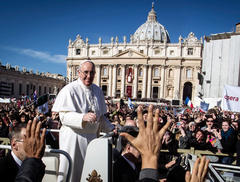 Are we done yet? Is it safe to go back outside? Now that Pope Francis has finally been “installed” on his throne in Rome, have these recent days of glassy-eyed, unctuous “pope-worship” in our media finally drawn to a close? Praise be to Jesus, let us hope and pray.
Are we done yet? Is it safe to go back outside? Now that Pope Francis has finally been “installed” on his throne in Rome, have these recent days of glassy-eyed, unctuous “pope-worship” in our media finally drawn to a close? Praise be to Jesus, let us hope and pray.At the risk of offending anyone, can we return to the crucial issue at hand? And that is not the sweetness of Francis’s smile, or the colour of his shoes, or the number of times he invokes the word “poor’ in his speeches.
Far more revealing is the fact that the only woman who was allowed to take part in Tuesday’s papal “installation” was a newsreader from Vatican Radio who recited a brief prayer. Equally revealing is who watched from the audience. Among the high and mighty in Rome from all corners of the world was a self-proclaimed “practising Catholic” from Harare, Zimbabwe: His name was Robert Mugabe. It undoubtedly embarrassed the Vatican that their guest will likely one day stand trial in The Hague for crimes against humanity, if he doesn’t die first.
*These odd vignettes* at the Pope’s installation this week were a reminder that there are issues, beyond the superficial, which will endure. Specifically, there is the questionable role of the Roman Catholic Church in this turbulent 21st century. How will it face its increasing scandals and many genuine flaws? And will the new Pope Francis actually make a difference?
Others can deal with the church’s spiritual side. I have a strictly secular view of the Catholic Church as a political organization. It performs well in certain circumstances and horribly in others. But in my many travels in Latin America, Africa and elsewhere, I see it playing a central role in the lives of millions. That is why it matters.
My perspective is that of a Jesuit-educated lapsed Catholic whose middle name was chosen by my religious parents in honour of St. Francis of Assisi and who, as a former altar boy, is still probably the only kid on my block who speaks some Latin.
I also happened to have been in Argentina in 1976, when the country was taken over by a bloody military dictatorship that launched its “dirty war” against resisters. This resulted in the death of up to 30,000 innocent people. At that time, although I didn’t know it then, Pope Francis was working there as a Jesuit priest and the 39-year-old head of the country’s Jesuit order.
There is a continuing debate about the Pope’s role in Argentina in the 1970s, but there are conflicting accounts. The most serious accusation is that he failed to protect two young priests who had been working with the poor in the shantytowns outside of Buenos Aires. These priests were eventually imprisoned and tortured. The Vatican has responded by saying that the Pope, at the time, actually arranged for the release of these priests.
*During 1975-76,* when I was travelling throughout South America, most countries were under the control of military dictatorships. In the shantytowns surrounding the main cities of Chile, Argentina and Brazil, many local priests were driven underground or imprisoned. A remarkable number who stayed and took their places were Canadian priests and nuns, many of them from Quebec. With few exceptions, I remember them being contemptuous of the Catholic Church hierarchy, which they felt was complicit with the military regimes.
At the time, an exception to this was in Brazil, where the legendary Catholic Archbishop Dom Helder Camara kept challenging the country’s military rulers. Branded by some as the “red bishop” for his support of the poor, he became famous for this phrase: “If I give food to the poor, they call me a saint. If I ask why the poor have no food, they call me a communist.”
To this day, that hypocrisy challenges the Roman Catholic Church in both the developing and developed world. In its treatment of women, its handling of the child abuse scandals, its views on contraception and its failure to recognize why gay rights are human rights, the church and its new Pope have many challenges.
A nice smile and a friendly manner will not quite do it.
*Tony Burman*, former head of Al Jazeera English and CBC News, teaches journalism at Ryerson University. tony.burman@gmail.com Reported by Toronto Star 2 hours ago.